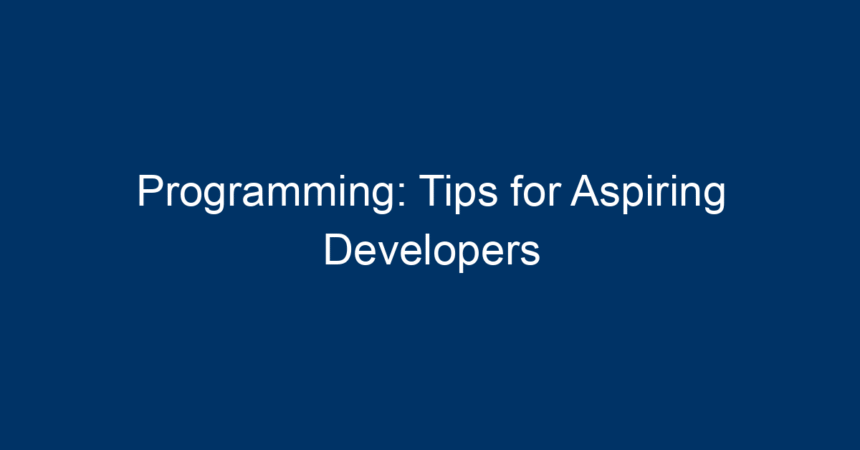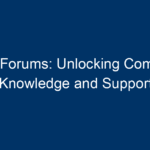Introduction
In today’s digital world, programming has become one of the most sought-after skills. Aspiring developers often find themselves overwhelmed by the vast array of languages, frameworks, and tools available. Whether you’re looking to build your first website, dive into mobile app development, or explore the world of artificial intelligence, mastering the art of programming is essential. This article provides practical tips for aspiring developers, helping you navigate the journey toward becoming a proficient programmer.
Understanding the Basics of Programming
What is Programming?
At its core, programming is the process of designing and building executable computer software to accomplish specific tasks. It involves writing source code in various programming languages, such as Python, JavaScript, or Java. Understanding the foundational concepts of programming is crucial for anyone looking to break into the field.
Choose the Right Language
When starting your programming journey, one of the most critical decisions is choosing your first programming language. Here are a few popular languages for beginners:
- Python: Known for its readability, Python is highly recommended for beginners. It’s versatile and widely used in web development, data analysis, and machine learning.
- JavaScript: If your interest lies in web development, JavaScript is vital. It allows you to create interactive and dynamic content on websites.
- Java: This language is well-suited for enterprise-level applications and is a staple in Android app development.
Building a Strong Foundation
Learn the Fundamentals
Before diving into complex projects, it’s essential to understand the fundamentals of programming:
- Data Types: Understand how to use integers, floats, strings, and booleans.
- Control Structures: Learn about conditionals (if-else statements) and loops (for, while).
- Functions: Grasp the importance of functions for code reusability.
- Data Structures: Familiarize yourself with arrays, lists, and dictionaries.
Utilize Online Resources
There is an abundance of resources available for aspiring programmers. Websites like Codecademy, freeCodeCamp, and Coursera offer free and paid courses to help you learn the basics. Online platforms like GitHub also allow you to explore open-source projects, enhancing your understanding of real-world applications in programming.
Practice, Practice, Practice
Hands-On Projects
One of the most effective ways to solidify your programming skills is through hands-on practice. Start small by building simple projects. Here are a few ideas:
- To-Do List App: Create a basic app to manage tasks. This project will help you understand user input and data storage.
- Personal Portfolio Website: Showcase your skills and projects by building a personal website. This project will introduce you to web development concepts.
Coding Challenges
Participating in coding challenges on platforms like LeetCode, HackerRank, and Codewars can sharpen your problem-solving skills and expose you to new programming concepts. These platforms offer problems ranging in difficulty, allowing you to progressively challenge yourself.
Engage with the Community
Join Online Forums
Engage with fellow aspiring developers and experienced professionals by joining online forums and communities. Websites like Stack Overflow and Reddit have dedicated programming communities where you can ask questions, share knowledge, and collaborate on projects.
Attend Coding Meetups
Networking is vital in the tech industry. Attend local tech meetups and conferences to connect with other developers. These events provide opportunities for collaboration, learning, and mentorship.
Specialize in an Area of Interest
Explore Different Domains
As you build your programming skills, explore various domains to find your passion:
- Web Development: Focus on front-end or back-end development. Learn about HTML, CSS, and frameworks like React or Django.
- Mobile Development: Explore Android or iOS development. Familiarize yourself with tools like Flutter or React Native.
- Data Science: Dive into data analysis and machine learning using languages like Python and R.
Continuous Learning
The tech landscape is ever-evolving, making continuous learning essential. Follow industry trends, subscribe to programming blogs, and take advanced courses to deepen your knowledge and skill set.
Build a Strong Portfolio
Showcase Your Work
As you complete projects, document your work and build a portfolio. A strong portfolio demonstrates your skills to potential employers and clients. Include:
- Project Descriptions: Briefly explain the purpose and functionality of each project.
- Code Samples: Include links to your GitHub repositories to showcase your coding abilities.
- Technical Skills: List programming languages and tools you are proficient in.
Get Involved in Open Source
Contributing to open-source projects is a fantastic way to gain real-world experience and enhance your resume. Platforms like GitHub and GitLab host numerous open-source projects looking for contributors. This involvement can also lead to valuable networking opportunities.
Stay Updated with Industry Trends
Follow Tech Blogs and Podcasts
The tech industry changes rapidly, so staying updated is vital. Follow influential blogs, podcasts, and YouTube channels centered around programming and technology. This practice will keep you informed about new languages, frameworks, and best practices.
Join Relevant Online Courses
Consider enrolling in specialized online courses to stay updated with emerging technologies like AI, machine learning, or blockchain. Platforms like Coursera, Udemy, and edX offer a wide variety of options.
Conclusion
Becoming a proficient programmer requires time, patience, and dedication. By focusing on the fundamentals, engaging with the programming community, and continuously learning, you can carve out a successful career in this exciting field. Remember to practice consistently, build a strong portfolio, and specialize in an area that excites you.
Unlock your potential in programming today and take the first step toward becoming the developer you’ve always wanted to be. With the right tools, resources, and mindset, the possibilities are limitless. Happy coding!




